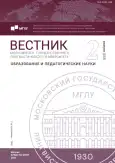Language Education: Learning for Life, Learning Throughout Life?
- Authors: Yastrebova E.B.1, Kryachkov D.A.1
-
Affiliations:
- MGIMO University, Ministry of Foreign Affairs of the Russian Federation
- Issue: No 2 (855) (2025)
- Pages: 90-97
- Section: Pedagogical Studies
- URL: https://bakhtiniada.ru/2500-3488/article/view/303428
- ID: 303428
Cite item
Abstract
The article explores the potential of foreign language teaching in higher education as preparation for lifelong language learning in its humanistic sense. Drawing on theoretical analysis and the study of best practices at MGIMO University, it identifies an effective synergy of universal and specialized skills as well as conditions ensuring their interconnected development. Additionally, it examines how artificial intelligence is reshaping the educational environment.
About the authors
Elena Borisovna Yastrebova
MGIMO University, Ministry of Foreign Affairs of the Russian Federation
Author for correspondence.
Email: yastel@yandex.ru
PhD in Education, Associate Professor
Professor of English Language Department No 1
Dmitry Alexandrovich Kryachkov
MGIMO University, Ministry of Foreign Affairs of the Russian Federation
Email: d.a.kryachkov@gmail.com
PhD in Linguistics, Associate Professor
Head of English Language Department No. 1 MGIMO University
References
- Зайцева О. В. Непрерывное образование: основные понятия и определения // Вестник Томского государственного педагогического университета. 2009. Вып. 7 (85). С. 106-109. EDN: KWOXQT
- Learning to Be: the world of education today and tomorrow / E. Faure, F. Herrera, A. Kaddoura et al. Paris: UNESCO, 1972.
- Biesta G. What's the Point of Lifelong Learning if Lifelong Learning Has No Point? On the Democratic Deficit of Policies for Lifelong Learning // European Educational Research Journal. 2006. Vol. 5. № 3-4. P. 169-180.
- Коряковцева Н. Ф., Демина Д. А. Традиции и перспективы развития отечественной методической науки в российской историографии (памяти А.А. Миролюбова). Часть 1. Начало XX в. - 60-е гг. // Вестник Московского государственного лингвистического университета. Образование и педагогические науки. 2024. Вып. 1 (850). С. 44-51. EDN: TULEXS
- Гальскова Н. Д., Коряковцева Н. Ф., Гусейнова И. А. Современная лингводидактика: монография. М.: Кнорус, 2021. EDN: GZHNJO
- Коряковцева Н. Ф. Понятие "медиация иноязычного текста" в контексте профессиональной коммуникации и информационной деятельности специалиста // Вестник Московского государственного лингвистического университета. Образование и педагогические науки. 2022. Вып. 1 (842). С. 43-48. EDN: AGPYSR
- Маркова А. К. Формирование мотивации учения в школьном возрасте: пособие для учителя. М.: Просвещение, 1983. EDN: YQCKKS
- Зимняя И. А. Педагогическая психология. Ростов-на-Дону: Феникс, 1997.
- Титова С. В. Технологические решения на базе искусственного интеллекта в обучении иностранным языкам // Вестник Московского университета. Серия 19: Лингвистика и межкультурная коммуникация. 2024. С. 18-37. EDN: OWSQVG
- Сысоев П. В., Филатов Е. М., Сорокин Д. О. Обратная связь в обучении иностранному языку: от информационных технологий к искусственному интеллекту // Язык и культура. 2024. № 65. С. 242-261. EDN: PLZYOV
- KarataşF., Abedi F. Y.; Ozek, Gunyel F. et al. Incorporating AI in foreign language education: An investigation into ChatGPT's effect on foreign language learners // Education and Information Technologies. 2024. Vol. 29. P. 19343-19366.
- Szabó F., Szoke J. How does generative AI promote autonomy and inclusivity in language teaching? // ELT Journal. 2024. Vol. 78. Issue 4. P. 478-488. EDN: UAROOD
- Мещерякова О. В. Возможности использования искусственного интеллекта для повышения мотивации студентов к изучению иностранных языков в вузе // Современные проблемы науки и образования. 2023. № 6. С. 92-98.
- Chazal de Edward. English for Academic Purposes. Oxford: OUP, 2014.
Supplementary files









